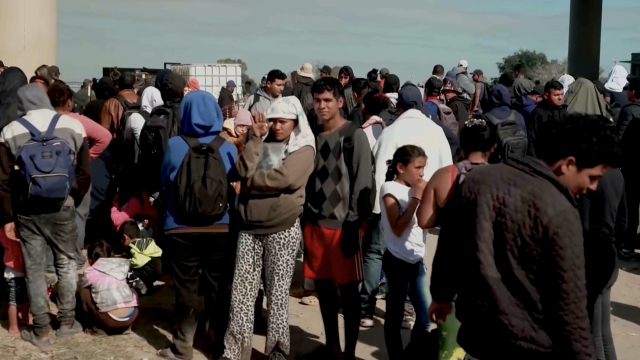For weeks, a deal linking international aid with U.S. border security has remained elusive in Congress. President Biden said he's willing to consider "significant" compromises on the border to try to get critical aid to places like Ukraine approved. But some of the proposals on the table have immigration advocates very concerned.
Republican lawmakers are pushing for new measures like making it harder to qualify for asylum, putting limits on humanitarian parole, increasing expedited removals and increasing detention capacity.
"So I've made this very clear from the very beginning, when I was handed the gavel, we needed clarity on what we're doing in Ukraine and how we'll have proper oversight of the spending of precious taxpayer dollars of the American citizens. And we needed a transformative change at the border," said House Speaker Mike Johnson.
Immigration advocates like Vanessa Cardenas, the executive director of America's Voice, say those ideas won't reduce the flow of migrants at the southern border.
"We are worried about the fact that they are advancing policies that we know don't work. The reason people come is because there are jobs here. And the reality is that that is a powerful, powerful magnet," she said.
She says trying to deter migrants with harsh penalties isn't effective.
"I think this notion of expedited removal should be off the table, any type of family detention should be off the table. I think this notion of closing down the borders should be off the table," Cardenas said.
Other advocates who work with migrants agreed. Ben Johnson, the executive director of the American Immigration Lawyers Association, told Scripps News the best way to reduce the strain on the border is to create more legal pathways for people to get here.
"That's why really one of the most profound, rapid ways to turn this around is to give people an option of a legal opportunity to come to the United States and work. There are cities and states around the country who need workers," Johnson explained.
He also said lawmakers need to look beyond the border and start tackling the problem before it reaches a port of entry.
"Most of the policies that are being discussed depend on people arriving at the border and then being processed at the border, making the standard tougher, requiring them to be detained. But we're still basically daring them to come to the southern border. And we're mostly pushing them into the hands of smugglers," Johnson said.
Any deal is likely to include a surge of border resources like hiring border patrol agents and immigration judges as well as helping the communities who are taking in these migrants. Both Johnson and Cardenas said that is much-needed.
SEE MORE: LGBTQ+ migrants at border face many challenges in quest for safety
Trending stories at Scrippsnews.com



